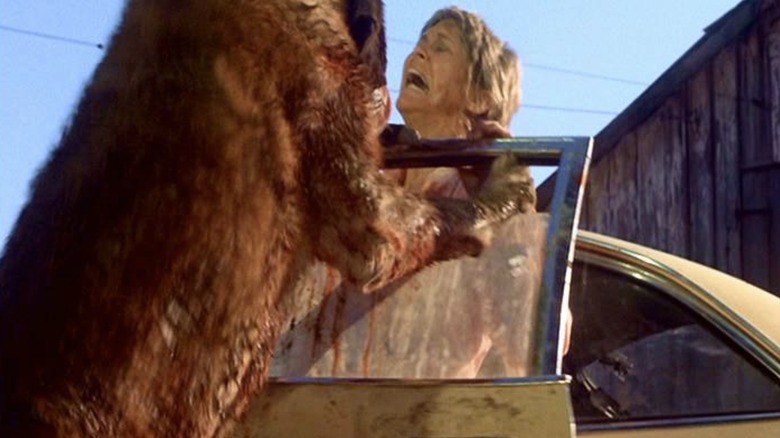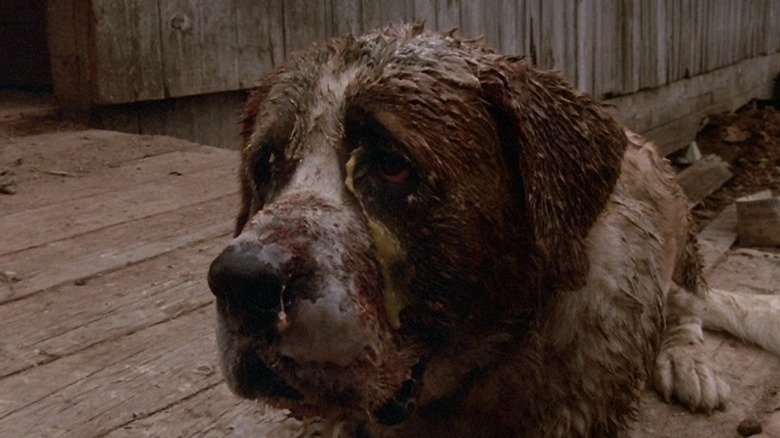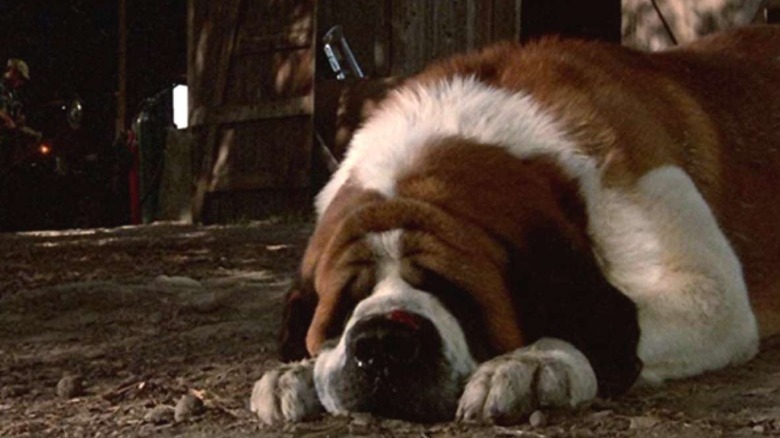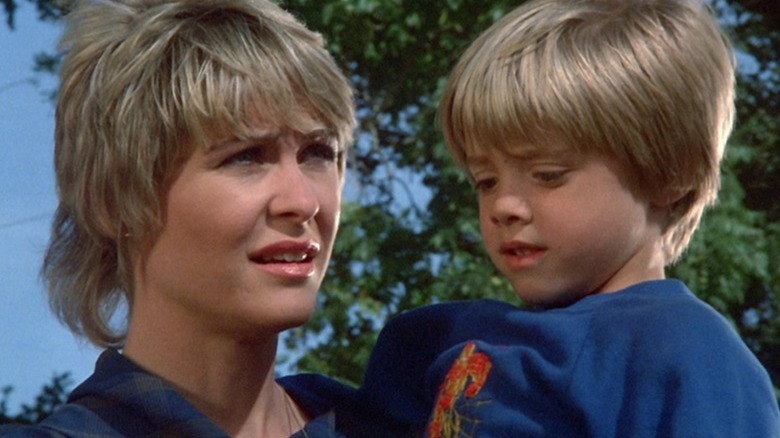Why Stephen King's Original Draft For Cujo Never Made It To The Screen
"It's not a monster, it's just a doggy!" In 1983, film audiences were exposed to one of the scariest dogs ever put to screen: Cujo. In the film based on Stephen King's best-selling novel, a rabies-stricken St. Bernard terrorizes the town of Castle Rock, Maine — including defenseless mom Donna (Dee Wallace) and her young son Tad (Danny Pintauro). The movie isn't usually counted among the best King adaptations, but it holds a special place in the minds of fans and unsuspecting viewers alike.
King's draft wasn't like the book
The film version of "Cujo" takes some marked detours from the book. But the earliest version of its script, penned by King himself, had much more in common with his 1981 book of the same name. In the making-of documentary "Dog Days: The Making of 'Cujo,'" director Lewis Teague explained the complicated screenwriting process for the movie. Teague himself replaced filmmaker Peter Medak early on, and says that King's was the first draft he read upon joining the project.
"I felt that he had strayed too far from the book,' Teague said in the making-of doc, though he doesn't explain exactly what liberties the horror master took with his own story when re-writing it for the screen. In his memoir, "On Writing," King admits to being so intoxicated during the writing of the novel version of "Cujo" that he can barely remember putting pen to page. The author, who has been sober for decades now, also told "Rolling Stone" he was a heavy cocaine user from 1978 until 1986 — a window that includes the period in which he would have written the "Cujo" script draft. King clearly wrote well no matter his state of mind, so there's no indication his drug habits impacted the "Cujo" script. But it does make sense that the writer may have wanted to take a second crack at a story he didn't remember writing in the first place.
Though Teague doesn't detail how King went off book with the "Cujo" draft, he explains that other writers were brought on board to rework it into the version we see on screen. "What this writer did, which I thought was brilliant, was go back to the book and edit it down," Teague shared. (The writer in question here is likely Barbara Turner, who wrote a version of the script under the pen name Lauren Currier, according to "Fangoria.")
The movie did away with the supernatural elements
The new screenplay stayed closer to the book, but Teague and his team ended up bringing in a third writer to tidy things up. According to the filmmaker, the script was by that point too long, and the third and final writer, Don Carlos Dunaway, worked "to streamline and reconnect the story after we'd eliminated subplots."
The result is a movie that, despite all the focus on sticking to the book, veers away from King's work in several key ways. Teague addresses a major one in the making-of documentary, explaining that he couldn't find a way to incorporate the novel's mentions of serial killer Frank Dodd. Dodd appeared in "The Dead Zone," and the book version of "Cujo" connects the killer dog's bloodthirsty habits to the spirit of Dodd. In "Dog Days: The Making of 'Cujo,'" the filmmaker said:
"In the book, the dog was a reincarnation of a bad guy from a previous book, and I toyed around with various ways of showing or suggesting that there was some real supernatural element in the closet, and I couldn't come up with any solution to that with our means at the time that wouldn't seem hokey to me. I decided to eliminate any kind of suggestion that there was really a supernatural monster in the story."
The adaptation's biggest change reframed the whole story
This makes sense, and I'm impressed that a director of an '80s King adaptation actually thought about what might look "hokey" when so many others clearly didn't. There's one change from page to screen that makes much less sense, though. In King's book, Tad dies a slow and miserable death at the end. It's a powerful, taboo-shattering moment that demonstrates that a mother's love isn't an all-encompassing superpower. You can love your kids, and bad things can still happen to them. This rattling conclusion makes "Cujo" the great book it is, but the movie changes the climax so that both mother and son make it out alive.
According to "Fangoria," the more tragic version of the ending was still intact when Turner turned in her draft, but Dunaway's final draft lost the death. The movie basically reverses the ending, with Donna going full supermom to kill the dog when it goes for the jugular one last time, like a slasher villain revived from the dead. Is it as powerful as the book's ending? Probably not. Does it make for dang good cinema? Yes! For his part, King loves how the movie turned out: in that same "Rolling Stone" interview, he calls the film "terrific."



